一般将来时与过去将来时学习资料
中考英语一般将来时和过去将来时专项讲解
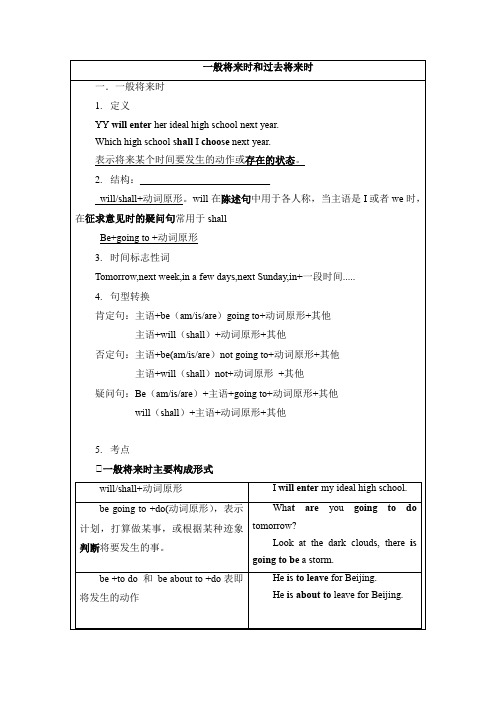
一般将来时和过去将来时一.一般将来时1.定义YY will enter her ideal high school next year.Which high school shall I choose next year.表示将来某个时间要发生的动作或存在的状态。
2.结构:__________________________will/shall+动词原形。
will在陈述句中用于各人称,当主语是I或者we时,在征求意见时的疑问句常用于shallBe+going to +动词原形3.时间标志性词Tomorrow,next week,in a few days,next Sunday,in+一段时间.....4.句型转换肯定句:主语+be(am/is/are)going to+动词原形+其他主语+will(shall)+动词原形+其他否定句:主语+be(am/is/are)not going to+动词原形+其他主语+will(shall)not+动词原形+其他疑问句:Be(am/is/are)+主语+going to+动词原形+其他will(shall)+主语+动词原形+其他5.考点①一般将来时主要构成形式will/shall+动词原形I will enter my ideal high school.be going to +do(动词原形),表示计划,打算做某事,或根据某种迹象判断将要发生的事。
Wha t are you going to do tomorrow?Look at the dark clouds, there is going to be a storm.be +to do 和be about to +do表即将发生的动作He is to leave for Beijing.He is about to leave for Beijing.He is leaving for Beijing.Be+doing表将来(come,go,leave,start等瞬间动词)翻一翻我将会待在这个漂亮的城市。
一般将来时与过去将来时知识点总结

点总结语法讲解:★一般将来时[_般将来时定义]:一般将来时表示与现在相比,将来某个时间要发生的动作或存在的状 态。
【一般将来时常见时间状语】 :to morrow 明天,the day after tomorrow 后天,soon 很快, before long 不久之后,in three days (weeks …)三天(周 .... )后,next week (month, year )下周(下个月、明年),some day 将来的某一天等等。
【一般将来时的构成】_般将来时肯定句构成方式:① 主语+ will / shall +动词(原形)+… 例句:I w 订1 buy some books tomorrow ・②主语 + be going to + 动词(原形)+ … 例句:I am going to buy some bookstomorrow ・_般将来时否定句构成方式:①主语+ w 订1 / shall +not +动词(原形)+…例句:I will not buy some books tomorrow ・② 主语+ be +not+ going to + 动词(原形)+… 例句:I am notgoing to buy some books tomoirow ・—般将来时疑问句构成方式:①Will / Shall +主语+动词原形+…例句:Will you buy some books tomorrow②Be + 主语+going to + 动词原形+… 例句: Are you going to buy some books tomorrow回答方式:肯定回答:①Yes,主语(代词)+will 否定回答:①No,主语(代词)+will +not 注意:在回答"Shall I 的问句时,一般不用shall 直接作答,而用“Yes, please. /No, please don' t ・”【一般将来时的基本用法】②Yes,主语(代词)+ be②No, 主语(代词)+be★过去将来时【过去将来时定义】:衣小•在过公果个时间看来将耍发丫的劲作或存在的状态。
【英语】过去将来时一般过去时知识点(大全)(word)

【英语】过去将来时一般过去时知识点(大全)(word)一、过去将来时1.—Uncle Sam said he ________ my birthday party, but he never showed up.—That's Uncle Sam. He forgets everything!A. will attendB. would attendC. has attendedD. had attended【答案】 B【解析】【分析】句意:——Sam叔叔说他将参加我的生日聚会,但是他从没有出现。
——那是Sam叔叔,他忘记所有事情了。
A.一般将来时;B.过去将来时;C.现在完成时;D.过去完成时。
根据showed可知与过去有关,Sam叔叔说将参加聚会,但是没来,所以用过去将来时,故选B。
【点评】考查过去将来时,注意平时识记,理解句意。
2.—What did Alice say?—She said she me at eight o'clock tomorrow morning.A. is callingB. was callingC. will callD. would call【答案】 D【解析】【分析】句意:爱丽丝说了什么?——她说她明天上午八点钟给我打电话。
结合语境可知下文从句中描述的是站在过去角度看将来发生的动作,故用过去将来时态。
选D。
【点评】英语中的时态主要是借助于时间状语与上下文语境来进行判断。
解答此类题型,首先要注意句子中的时间状语,如果没有则要通过分析上下文,结合语境来判断句子的时态。
英语疑问句中一般具有时态上的对应关系,注意结合这一特点进行区分。
3.Tim told us that his company ______ robots to do some of the work.A. usesB. will useC. has usedD. would use【答案】 D【解析】【分析】句意:蒂姆告诉过我,他的公司会使用机器人做工作的一部分。
一般将来时与过去将来时
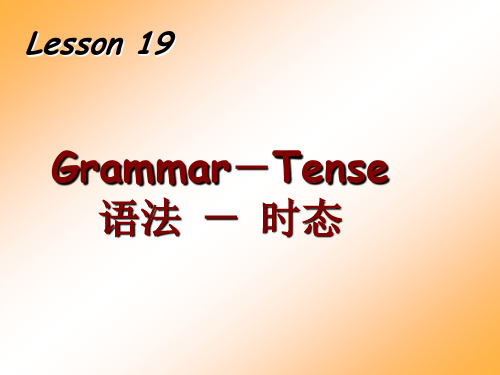
2. be going to do 的含义
be going to do 用于表示计划、打算去做某事(强 调主观意愿);还可以表示根据事实情况,有 迹象极有可能发生的事。如:
示将要发生的动作。
e.g. • I’m coming. (我就来了。) • Are we all going ? (我们都将去吗?)
4. “主将从现”原则
在含有条件状语从句或时间状语从句的复
合句中,从句用一般现在时,主句用将 来时,且用will而不用be going to。如:
• Mum will go to Beijing if(如果) it doesn’t rain tomorrow.
• When(当…的时候) you get home, you’ll find a new bike in your garden.
5. 表示将来时的其他词组
1. be +to不定式表将来,按计划或正式安排将 发生的事。
e.g. We are to discuss the report next Saturday. 我们下星期六讨论这份报告。
We didn’t know whether they were going to give us a talk this afternoon. I didn’t know when he would leave for Shanghai.
2. 过去将来时常用于间接引语中
He said he would come back the next day. He told me that he would go back soon.
掌握时态一般将来时和过去将来时

掌握时态一般将来时和过去将来时一般将来时和过去将来时是英语中常用的两种时态形式,它们帮助我们描述将来发生的动作或事件,同时强调时间的关系。
在本文中,我们将重点探讨这两种时态的用法和相应的例句。
一、一般将来时(Simple Future Tense)一般将来时用来表达将来某个时间发生的动作或事件。
我们可以使用以下几种结构来构成一般将来时:1. 使用“will + 动词原形”构成句子,表示决定或预测的未来动作或事件。
例如:- I will visit my grandparents this weekend.(我会在这个周末去拜访我的祖父母。
)- He will be a doctor when he grows up.(他长大后会成为一名医生。
)2. 使用“be going to + 动词原形”表示计划、意愿或打算去做某事。
例如:- I am going to study abroad next year.(明年我打算出国留学。
)- She is going to have a party on Friday.(她打算在周五举办一个派对。
)3. 使用“shall + 动词原形”构成句子,表示“我将”,主要用于“我们”(“we”)和“我”(“I”)。
例如:- We shall meet at the park tomorrow.(明天我们将在公园见面。
)- Shall I help you with the bags?(我应该帮你拿行李吗?)二、过去将来时(Future in the Past Tense)过去将来时用于描述在过去某个时间点将来会发生的动作或事件。
我们可以使用以下结构来构成过去将来时:1. 使用“would + 动词原形”构成句子,表示过去某个时间点的将来动作。
例如:- He said he would come to the party.(他说他会来参加派对。
)- She told me she would give me a call later.(她告诉我她稍后会给我打电话。
一般将来时与过去将来时知识点总结

一般将来时与过去将来时知识点总结一般将来时(Future Simple Tense)是指表示将来一些时间发生的动作或状态。
在英语中,一般将来时的构成使用助动词“will”或者“shall”加动词的原形。
以下是一般将来时的一些重要知识点总结。
1. 构成:一般将来时的基本结构是“will/shall + 动词原形”。
例如:I will go to the party tonight.(我今晚要去参加派对。
)3. 疑问形式:在一般将来时的疑问形式中,将助动词“will”或者“shall”放到句首。
例如:Will you help me with my homework?(你会帮我做作业吗?)4.用法:- 表示将来时间的动作或事件:I will visit my grandparentsnext weekend.(我下周末会去看望我的祖父母。
)- 表示打算或意愿:He will help you with the project.(他愿意帮助你完成这个项目。
)- 表示预测或推测:I think it will rain tomorrow.(我认为明天会下雨。
)5. 时间状语:一般将来时通常与一些表示将来时间的时间状语连用,例如:tomorrow(明天)、next week(下星期)、soon(很快)等。
过去将来时(Future in the Past)是指在过去一些时刻认为将来一些时间会发生的动作或状态。
主要用于叙述过去的故事或描述过去的情况。
以下是过去将来时的一些重要知识点总结。
2. 否定形式:在过去将来时的否定形式中,将助动词“would”或者“should”和动词原形之间加上“not”。
例如:She said she wouldnot be able to attend the meeting.(她说她不能去参加会议。
)3. 疑问形式:在过去将来时的疑问形式中,将助动词“would”或者“should”放到句首。
【英语】过去将来时一般过去时 复习经典

【英语】过去将来时一般过去时复习经典一、过去将来时1.—What did your son say in the letter?—He told me that he the Disney World the next day.A. will visitB. has visitedC. is going to visitD. would visit【答案】 D【解析】【分析】句意:——你儿子在信中说了什么?——他告诉我他第二天要参观迪斯尼乐园。
A.将参观,一般将来时;B.已经参观,现在完成时;C.将去参观,一般将来时;D.将去参观,过去将来时。
the next day表明是将来时,told表明是过去时,所以用过去将来时,结构是would+动词原形,故选D。
【点评】考查过去将来时,注意平时识记would+动词原形。
2.—What did your son say in the letter?—He told me that he __________ the Great Wall the next day.A. will visitB. has visitedC. is going to visitD. would visit【答案】 D【解析】【分析】句意:你的儿子在信中说什么?他告诉我他第二天要去参观长城.结合语境可知从句描述的是站在过去角度看将来发生的动作,故用过去将来时态,故选D.【点评】英语中的时态主要是借助于时间状语与上下文语境来进行判断。
解答此类题型,首先要注意句子中的时间状语,如果没有则要通过分析上下文,结合语境来判断句子的时态。
英语疑问句中一般具有时态上的对应关系,注意结合这一特点进行区分。
3.Tim told us that his company ______ robots to do some of the work.A. usesB. will useC. has usedD. would use【答案】 D【解析】【分析】句意:Tim 告诉我们他的公司将要使用机器人来做一些工作。
一般将来时与过去将来时知识点总结
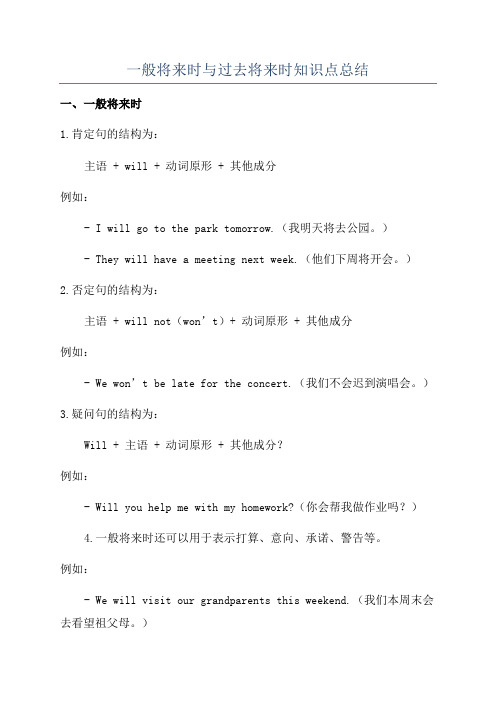
一般将来时与过去将来时知识点总结一、一般将来时1.肯定句的结构为:主语 + will + 动词原形 + 其他成分例如:- I will go to the park tomorrow.(我明天将去公园。
)- They will have a meeting next week.(他们下周将开会。
)2.否定句的结构为:主语 + will not(won’t)+ 动词原形 + 其他成分例如:- We won’t be late for the concert.(我们不会迟到演唱会。
)3.疑问句的结构为:Will + 主语 + 动词原形 + 其他成分?例如:- Will you help me with my homework?(你会帮我做作业吗?)4.一般将来时还可以用于表示打算、意向、承诺、警告等。
例如:- We will visit our grandparents this weekend.(我们本周末会去看望祖父母。
)- He will work hard to pass the exam.(他会努力学习以通过考试。
)- I won’t accept the j ob offer.(我不会接受这个工作机会。
)5.当表示将来的时间或条件时,可以使用其他时间状语或条件从句来修饰。
例如:二、过去将来时过去将来时用于表示过去一些时间将要发生的动作或状态,一般由助动词"would"或"should"加上动词的原形构成。
1.肯定句的结构为:主语 + would / should + 动词原形 + 其他成分例如:- She said she would meet me at the airport yesterday.(她说她昨天会在机场接我。
)- They knew they should finish their homework before going out.(他们知道他们应该在出去之前完成作业。
最新过去将来时一般过去时知识点总结(word)
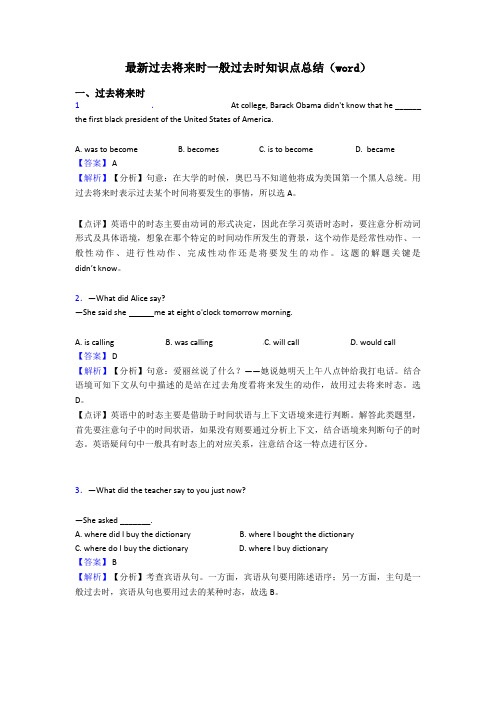
最新过去将来时一般过去时知识点总结(word)一、过去将来时1.At college, Barack Obama didn't know that he ______ the first black president of the United States of America.A. was to becomeB. becomesC. is to becomeD. became【答案】 A【解析】【分析】句意:在大学的时候,奥巴马不知道他将成为美国第一个黑人总统。
用过去将来时表示过去某个时间将要发生的事情,所以选A。
【点评】英语中的时态主要由动词的形式决定,因此在学习英语时态时,要注意分析动词形式及具体语境,想象在那个特定的时间动作所发生的背景,这个动作是经常性动作、一般性动作、进行性动作、完成性动作还是将要发生的动作。
这题的解题关键是didn’t know。
2.—What did Alice say?—She said she me at eight o'clock tomorrow morning.A. is callingB. was callingC. will callD. would call【答案】 D【解析】【分析】句意:爱丽丝说了什么?——她说她明天上午八点钟给我打电话。
结合语境可知下文从句中描述的是站在过去角度看将来发生的动作,故用过去将来时态。
选D。
【点评】英语中的时态主要是借助于时间状语与上下文语境来进行判断。
解答此类题型,首先要注意句子中的时间状语,如果没有则要通过分析上下文,结合语境来判断句子的时态。
英语疑问句中一般具有时态上的对应关系,注意结合这一特点进行区分。
3.—What did the teacher say to you just now?—She asked _______.A. where did I buy the dictionaryB. where I bought the dictionaryC. where do I buy the dictionaryD. where I buy dictionary【答案】 B【解析】【分析】考查宾语从句。
动词时态用法归纳过去将来时一般过去时知识点总结讲义-2022届高考英语语法复习专题

动词时态用法归纳过去将来时一般过去时知识点总结讲义-2022届高考英语语法复习专题英语动词时态用法归纳过去将来时、一般过去时知识点总结过去将来时一、基本结构would+动词原形。
二、基本用法(1) 表示从过去某一时间来看将要发生的事情。
常用于宾语从句中。
如:He said he would come. 他说他要来。
He told us he would go with us. 他告诉我们他会和我们一起去。
They were sure that they would win. 他们坚信他们会赢。
【注】在一定的语境中也可于其他从句或句子中:It was a problem whether they would support us. 他们是否会支持我们还是一个问题。
It was six o’clock. The sun would soon set.这时是六点钟。
太阳即将落山。
(2) 过去将来时常可用来表示过去习惯性的动作。
如:Whenever he had time, he would help his mother with the housework. 他一有时间就帮妈妈做家务活。
(3) 还可用来表示愿望或倾向。
如:He told me that the machine wouldn’t work.他告诉我机器开不动。
We knew that he would never permit such a thing. 我们知道他决不会允许发生这样的事。
三、过去将来时间的几种常见表达方式(1) was (were) going to+动词原形。
①表示过去某时准备做某事。
如:Marsha said she was going to have a try. 玛莎说她准备试试。
He was going to leave when I came in. 我进来时他正要离开。
②was going to有时可表示过去未曾实现的想法或打算。
一般将来时与过去将来时的用法比较初中知识点总结
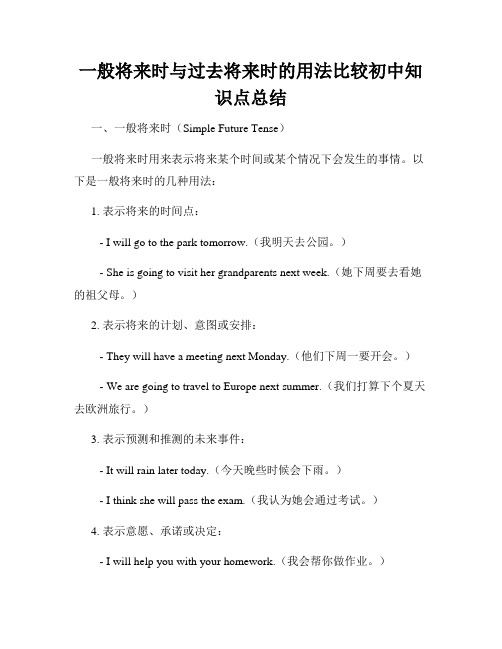
一般将来时与过去将来时的用法比较初中知识点总结一、一般将来时(Simple Future Tense)一般将来时用来表示将来某个时间或某个情况下会发生的事情。
以下是一般将来时的几种用法:1. 表示将来的时间点:- I will go to the park tomorrow.(我明天去公园。
)- She is going to visit her grandparents next week.(她下周要去看她的祖父母。
)2. 表示将来的计划、意图或安排:- They will have a meeting next Monday.(他们下周一要开会。
) - We are going to travel to Europe next summer.(我们打算下个夏天去欧洲旅行。
)3. 表示预测和推测的未来事件:- It will rain later today.(今天晚些时候会下雨。
)- I think she will pass the exam.(我认为她会通过考试。
)4. 表示意愿、承诺或决定:- I will help you with your homework.(我会帮你做作业。
)- He won't be late for the meeting.(他不会迟到开会。
)5. 表示习惯性的将来行为:- My dad usually goes for a run every morning.(我爸爸通常每天早上去跑步。
)- I always eat breakfast before leaving for school.(我出门上学之前总是吃早餐。
)二、过去将来时(Future in the Past)过去将来时用来表示在过去某个时间点认为将来会发生的事情。
以下是过去将来时的几种用法:1. 表示过去某个时间点的将来:- He said he would clean the house the next day.(他说他第二天要打扫房子。
初三一般将来时和过去将来时教法总结与技巧指导

语法教研成果系列三学科知识点:将来时教法总结与技巧点拨Part1知识点总结概括知识点1:一般将来时知识点总结:概念:一般将来时表示将来某一时刻或经常发生的动作或状态。
①一般将来时的时间状语有:tomorrow, this (afternoon),next (year),one day, now, soon, someday, sometime, in the future, when引导的从句等。
②用will构成的将来时,表示动作与人的主观愿望无关。
“shall”用于第一人称,“will”用于所有人称。
如:Iwill graduate from this school soon./ You will stay alone after I leave.③“am/is/are going to+动词原形”表示打算或准备要做的事情,或者主观判断即将要发生的事情,而“am/is/are to +动词原形”表示安排或计划中的动作。
如: A man told them that the woman was to give birth to the special baby. / It’s going to rain soon.④表示一个人临时决定要做某事,可以用will表达。
如:I will go to the lab to get some chemicals(化学药剂). So please wait until I return.⑤现在进行时、一般现在时也可以表示将来。
(见相应时态)⑥shall和will在口语的一些疑问句中相当于情态动词。
Shall一般与第一人称连用,will与第二人称连用。
如:Shall we go to the zoo next Saturday?/ Will you please open the door for me?⑦“be to +动词原形”表示按照计划将要发生的事情。
语法中的一般将来时与过去将来时

语法中的一般将来时与过去将来时一般将来时与过去将来时是英语语法中的两个重要时态。
它们用来描述将来发生或已经发生的动作、事件或情况。
本文将介绍一般将来时与过去将来时的概念、用法以及相关例句。
一、一般将来时一般将来时(Simple Future Tense)用于表示将来某个时间或条件下将要发生的动作、事件或情况。
一般将来时的构成如下:1. 肯定句:主语 + will + 动词原形2. 否定句:主语 + will not + 动词原形3. 疑问句:Will + 主语 + 动词原形?例如:1. I will buy a new car next month.(我下个月将买一辆新车。
)2. They will not attend the party tonight.(他们今晚不会参加聚会。
)3. Will you join us for dinner tomorrow?(你明天会和我们一起吃饭吗?)二、过去将来时过去将来时(Future in the Past)用于表示过去某个时间或条件下本来将要发生的动作、事件或情况,但实际并未发生。
过去将来时的构成如下:1. 肯定句:主语 + would + 动词原形2. 否定句:主语 + would not + 动词原形3. 疑问句:Would + 主语 + 动词原形?例如:1. He said he would help me with my homework.(他说他会帮我做作业。
)2. We knew she would not be able to come.(我们知道她将不能来。
)3. Would you like some coffee?(你想要一些咖啡吗?)三、一般将来时与过去将来时的区别一般将来时与过去将来时之间存在一些区别。
一般将来时用于表示将来的情况,而过去将来时用于表示过去的将来情况。
一般将来时使用will,而过去将来时使用would。
例如:1. I will visit my grandparents tomorrow. (一般将来时)(我明天要去看望我的祖父母。
一般将来时与过去将来时知识点总结

一般将来时与过去将来时知识点总结一、一般将来时(Simple Future Tense):1. 构成:将来时的一般肯定句由“助动词will + 动词原形”构成,即主语 + will + 动词原形。
2. 否定形式:在助动词will后面加上not,即will not 或won't。
3. 疑问形式:将助动词will提前到句首,即will + 主语 + 动词原形。
4.使用场景:a.表示对未来的预测、判断或意愿。
b.表示承诺、决心或意愿。
c.表示请求、邀请或建议。
d.表示命令或指示。
5.注意事项:a. 不要将will和shall混淆使用,shall一般只用于第一人称(I和we)的疑问句和建议句中。
b. 有时可以使用be going to + 动词原形来表示将来时,特别是当我们对未来发生的事情有较强的信心或根据已有的证据得出结论时。
二、过去将来时(Future in the Past Tense):1. 构成:过去将来时的构成由“助动词would + 动词原形”或“was/were going to + 动词原形”构成。
2.使用场景:a.表示对过去事情发生的预测、计划或意愿。
b.表示对过去人对未来发生的动作、事件或情况的预测或假设。
3.注意事项:a.过去将来时一般只用于过去发生的陈述句、疑问句和条件句中。
b.过去将来时不会出现在与现在相关的时间状语从句中,而是与过去相关的时间状语从句中。
例如:1. I will go to the party tomorrow evening.(我明天晚上要去参加派对。
)2. He won't be there next week.(下周他不会在那里。
)3. Will you help me with my homework?(你会帮我做作业吗?)4. The teacher will explain the lesson tomorrow.(老师明天会解释这课。
【英语】过去将来时一般过去时知识点(大全)
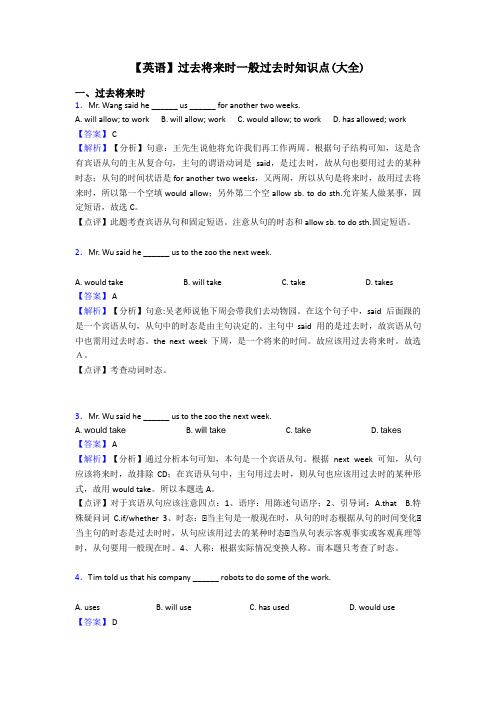
【英语】过去将来时一般过去时知识点(大全)一、过去将来时1.Mr. Wang said he ______ us ______ for another two weeks.A. will allow; to workB. will allow; workC. would allow; to workD. has allowed; work 【答案】 C【解析】【分析】句意:王先生说他将允许我们再工作两周。
根据句子结构可知,这是含有宾语从句的主从复合句,主句的谓语动词是said,是过去时,故从句也要用过去的某种时态;从句的时间状语是for another two weeks,又两周,所以从句是将来时,故用过去将来时,所以第一个空填would allow;另外第二个空allow sb. to do sth.允许某人做某事,固定短语,故选C。
【点评】此题考查宾语从句和固定短语。
注意从句的时态和allow sb. to do sth.固定短语。
2.Mr. Wu said he ______ us to the zoo the next week.A. would takeB. will takeC. takeD. takes【答案】 A【解析】【分析】句意:吴老师说他下周会带我们去动物园。
在这个句子中,said 后面跟的是一个宾语从句,从句中的时态是由主句决定的。
主句中said 用的是过去时,故宾语从句中也需用过去时态。
the next week 下周,是一个将来的时间。
故应该用过去将来时。
故选A。
【点评】考查动词时态。
3.Mr. Wu said he ______ us to the zoo the next week.A. would takeB. will takeC. takeD. takes【答案】 A【解析】【分析】通过分析本句可知,本句是一个宾语从句。
根据next week可知,从句应该将来时,故排除CD;在宾语从句中,主句用过去时,则从句也应该用过去时的某种形式,故用would take。
中考人教版初中复习语法---一般将来时和过去将来时教学案及练习

中考人教版初中复习语法---一般将来时和过去将来时教学案及练习同学英语学科核心素养培养与个性发展研究巩固练习一.选择填空1. Li Ming said he _____happy if Brian_____to China next month.A. as; comeB. was; would comeC. would be; cameD. will be; come2. Jenny said she _____her holiday in China.A. spentB. would spentC. was going to spentD. would spend3. —What did your son say in the letter?—He told me that he ______ the Disney World the next day.A. will visitB. has visitedC. is going to visitD. would visit4. Father said that he ______ me to Beijing the next year.A. tookB. would takeC. takesD. will take5. We were not sure whether they ______ more vegetables.A. are going to growB. were going to growC. will growD. have grown6. She ______ to work when the telephone rang.A. is goingB. will goC. was about to goD. is to go7. – Where is the morning paper? – I ________ if for you at once.A. getB. am gettingC. to getD. will get8. ________ a concert next Saturday?A. There will beB. Will there beC. There can beD. There are9. If they come, we ________ a meeting.A. haveB. will haveC. hadD. would have10. He ________ her a beautiful hat on her next birthday.A. givesB. gaveC. will givingD. is going to give11. He ________ to us as soon as he gets there.A. writesB. has writtenC. will writeD. wrote12. He ________ in three days.A. coming backB. came backC. will come backD. is going to coming back13. If it ________ tomorrow, we’ll go roller-skating.A. isn’t rainB. won’t rainC. doesn’t rainD. doesn’t fine14. – Will his parents go to see the Terra Cotta Warriors tomorrow? – No, ____(不去).A. they willn’t.B. they won’t.C. they aren’t.D. they don’t.15. We ________ the work this way next time.A. doB. will doC. going to doD. will doing16. Tomorrow he ________ a kite in the open air first, and then ________ boating in the park.A. will fly; will goB. will fly; goesC. is going to fly; will goesD. flies; will go17. The day after tomorrow they ________ a volleyball match.A. will watchingB. watchesC. is watchingD. is going to watch18. There ________ a birthday party this Sunday.A. shall beB. will beC. shall going to beD. will going to be19. They ________ an English evening next Sunday.A. are havingB. are going to haveC. will havingD. is going to have20. ________ you ________ free next Sunday?A. Will; areB. Will; beC. Do; beD. Are; be二. 用所给动词的适当形式填空1. Miss Zhang said she ________(visit) the Great Wall next summer.2. She told him that she ________(not stay) here for long.3. I wasn’t sure whether Lucy_______(come) the next year.4. The scientists said the world’s population _______ (slow) down in future.5. She said the bus _______(leave) at five the next morning.6. I wasn't sure whether he _______(lend) me his book the next morning.7. He was fifty-six. In two years he _______(be) fifty-eight.8. Whenever she has time, she ______(help) them in their work.一、英语阅读理解专项练习试卷1.阅读理解China's second female astronaut, Wang Yaping, has given the country's first-ever video lecture from space. The whole lecture lasted about 40 minutes.Speaking to students through live video, from the Tiangong-I space laboratory, Ms. Wang used spinning tops (旋转的陀螺), a ball and some water to explain physics in zero-gravity(失重), with the help of a fellow astronaut.Ms. Wang used different experiments to demonstrate the concepts of weight and mass(重量和质量的概念) in space. Towards the end of the class, Ms. Wang made a film(薄膜) of water using a metal ring. She then turned the film of water into a water ball by pouring more water onto it.Around 330 primary and secondary school students watched the lecture from a special classroom in Beijing, where they could also ask Ms. Wang questions through live video. From time to time, the students greeted her lecture with warm applause(掌声).When answering a student's question, Ms. Wang described what she could see in space. "The stars we see are much brighter, but they do not twinkle(闪烁)," she said, "The sky we see isn't blue, but black. And every day, we can see the sun rise 16 times because we circle the Earth every 90 minutes."About 60 million students and teachers around China also watched the lecture live on TV.(1)What's the purpose(目的) of the space lecture?A. To explain physics of zero-gravity in space.B. To demonstrate the concept of weight and mass in space.C. To tell us what can be seen in space.D. To show that the Earth is far away from space.(2)What does the underlined word "demonstrate" in the passage most probably mean in Chinese?A. 区别B. 强调C. 传授D. 演示(3)Towards the end of the lecture, Wang Yaping made a film of water so as to .A. play with itB. use a metal ringC. turn it into a water ballD. pour more water onto it(4)About students and teachers watched the lecture both from a special classroom and on TV.A. 330B. 60,000,000C. 6,000,330D. 60,000,330(5)Which is NOT true according to the passage?A. Wang Yaping is China's second female astronaut.B. Wang Yaping gave the lecture from space all by herself.C. The lecture was warmly welcomed by the students.D. The sky isn't blue but black when astronauts see it in space.【答案】(1)A(2)D(3)C(4)D(5)B【解析】【分析】文章大意:中国的第二位女宇航员王亚平已经在空间上发表了全国第一个视频讲座。
- 1、下载文档前请自行甄别文档内容的完整性,平台不提供额外的编辑、内容补充、找答案等附加服务。
- 2、"仅部分预览"的文档,不可在线预览部分如存在完整性等问题,可反馈申请退款(可完整预览的文档不适用该条件!)。
- 3、如文档侵犯您的权益,请联系客服反馈,我们会尽快为您处理(人工客服工作时间:9:00-18:30)。
(根据事实极有可能发生)
(1)主语的意图,即将做某事。例如:What are you going to do tomorrow? 明天打算作什么呢?
一般将来时与过去将来时
一般将来时
一、一般将来时的意义:
用来描述一个即将要发生的动作;谈 论未来的计划和打算。
• 二、一般将来时的基本结构:
will/shall+动词原形 be going to+动词原形
三day
• tomorrow
• next week
• tonight
般现在时表将来。
一般将来时 小结
3、be +to do,按计划或正式安排将发生的事。
4、be about to do,意为马上做某事。
! 注意:be about to do 不能与 tomorrow, next week 等表示明确将来时的时间状语连 用。
5. 时间状语: next…, the coming …, tomorrow …, in …, in the future, this afternoon等等.
• When(当…的时候) you get home, you’ll find a new bike in your garden.
5. 表示将来时的其他词组
1. be +to不定式表将来,按计划或正式安排将 发生的事。
e.g. We are to discuss the report next Saturday. 我们下星期六讨论这份报告。
否定句
• I will not say= I won’t /wכnt/ say • You will not see= You won’t see • He will not think= He won’t think • She will not talk= She won’t talk • It will run 改否定句 … • They’ll chat改否定句 … • We’ll make改否定句 …
一般将来时 小结
1、shall用于第一人称,常被will 所代替。 Which part shall I read first? Will you be at home at seven this evening? 2、be going to do (1)主语的意图,即将做某事。 (2)有迹象要发生的事。 will 主将从现用法时 ,主句只能用will,从句用一
• the coming Sunday • in a few minutes
• next year
• in the future
• This afternoon • five years later
• /evening
• from now on
注意事项
考点
1. Will 和Shall的区别
will用于一切人称,shall只用于第一人称 (I/we)。但现代英语倾向于所有人称都使 用will而不用shall,shall主要出现在非常 正式的英语场合中,或用于口语提出建 议或请求。如:
示将要发生的动作。
e.g. • I’m coming. (我就来了。) • Are we all going ? (我们都将去吗?)
4. “主将从现”原则
在含有条件状语从句或时间状语从句的复
合句中,从句用一般现在时,主句用将 来时,且用will而不用be going to。如:
• Mum will go to Beijing if(如果) it doesn’t rain tomorrow.
2. be about to +不定式,意为马上做某事。
e.g. He is about to leave for Beijing. 他马上要去北京。
区别:be about to do 不能与 tomorrow, next week 等表示明确将来时的时间状语连用。
一般将来时的否定、 疑问及回答
一般将来时的肯定句
(2)计划,安排要发生的事。例如:The play is going to be on next month。这出戏下月上演。
(3)有迹象要发生的事。例如:Look at the dark clouds, it is going to rain. 看那乌云,快要下雨了。
3. 现在进行时表将来
在英语中,有些动词如go,come,leave,begin arrive,start,fly等位置移动词可用现在进行时表
一般疑问句及回答
• I will say… → Will you say …? Yes, I will. • You will see… → Will I see …? No, you won’t. • He will think… → Will he think…? Yes, he will. • She will talk → Will she talk…? No, she won’t. • It will run 改疑问句并回答 … • They’ll chat改疑问句并回答 … • We’ll make改疑问句并回答 …
• I will say= I’ll say • You will see= You’ll see • He will think= He’ll think • She will talk= She’ll talk • It’ll run = … • They’ll chat = … • We will make = …
过去将来时的构成: should/would + 动词原形
• Shall I go home now? (请求) • Shall we take different routes? (建议)
2. be going to do 的含义
be going to do 用于表示计划、打算去做某事(强 调主观意愿);还可以表示根据事实情况,有 迹象极有可能发生的事。如:
